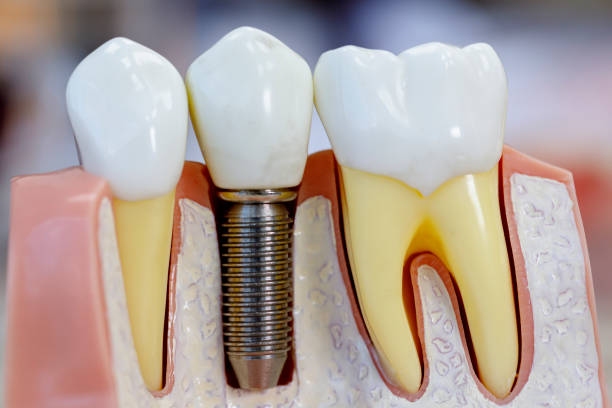Dentures or Dental Implants: Which is Right for You?

Choosing between dentures and dental implants can be a big decision, especially when it comes to restoring your smile and oral health. Both options offer unique benefits, but they cater to different needs and lifestyles. Dentures have been a traditional solution for missing teeth for many years, providing an affordable and non-invasive option.
On the other hand, dental implants are a more modern approach, offering a permanent and natural-looking alternative that closely mimics the function of natural teeth. So, how do you decide which is right for you?
Understanding the differences, benefits, and considerations of each option can help you make an informed choice that suits your specific needs and preferences. Let’s explore the key factors to consider when choosing between dentures and dental implants.
What are the main differences between dentures and dental implants?
Dentures and dental implants are both solutions for replacing missing teeth, but they differ significantly in structure, function, maintenance, and cost:
- Structure
- Dentures are removable prosthetic devices made of acrylic or a combination of acrylic and metal. They sit on the gums and are held in place with suction or adhesive.
- Dental Implants: Implants are titanium posts surgically implanted into the jawbone. They serve as artificial tooth roots to support individual crowns or bridges.
- Functionality
- Dentures: They restore the appearance of a full smile and help with chewing and speaking, but they may feel less natural and stable compared to implants.
- Dental Implants: Implants function like natural teeth, providing a strong, stable foundation. They allow normal chewing, speaking, and oral hygiene routines without slippage or discomfort.
- Bone Health
- Dentures: Dentures do not prevent bone loss in the jawbone, which can occur over time due to lack of stimulation from tooth roots.
- Dental Implants: Implants integrate with the jawbone, stimulating it and preventing bone loss. This helps maintain facial structure and overall oral health.
- Maintenance
- Dentures: Require daily removal for cleaning and soaking, as well as periodic adjustments to maintain fit as the jawbone changes shape.
- Dental Implants: These are cared for like natural teeth, requiring regular brushing, flossing, and dental check-ups. They are generally more convenient and do not need to be removed for cleaning.
- Longevity
- Dentures: Typically need replacement every 5 to 7 years due to wear and changes in the mouth.
- Dental Implants: With proper care, implants can last a lifetime, making them a more durable long-term investment.
- Cost
- Dentures: Generally more affordable upfront, especially if replacing an entire arch of teeth.
- Dental Implants: These can be more expensive initially due to the surgical procedure and materials involved, but they offer greater longevity and functionality.
Choosing between dentures and dental implants often depends on factors such as oral health, budget, aesthetic preferences, and lifestyle. Consulting with a dentist or prosthodontist can help determine which option best meets your needs.
How do you decide between dentures and dental implants?
Deciding between dentures and dental implants involves considering several factors to determine which option best suits your needs, lifestyle, and budget. Here are key points to consider when making this decision:
- Oral Health: The condition of your gums and jawbone is critical. Dental implants require healthy gums and adequate bone density to support the implant. If you have significant bone loss or gum disease, you might need additional procedures like bone grafts before implants can be considered.
- Cost and Budget: Dental implants are typically more expensive than dentures due to the surgical procedure and the materials used. While implants might be costlier upfront, they often offer greater durability and longer-term cost-effectiveness. Consider your budget and how you value the long-term investment versus the immediate cost.
- Aesthetic and Functional Preferences: Implants are likely the better choice if a permanent solution closely mimics natural teeth is important to you. They provide a more natural feel and function and do not require the same daily maintenance level as dentures. However, dentures may be more appropriate if you prefer a non-surgical option or require a quicker solution.
- Lifestyle Considerations: Consider your daily activities and the impact your tooth replacement might have. Implants allow for more natural eating and speaking and do not require removal for cleaning, making them more convenient for an active lifestyle. Dentures can sometimes slip or require adjustments, which might be disruptive for some individuals.
- Longevity and Durability: With proper care, implants can last a lifetime, whereas dentures must be replaced every 5 to 10 years. This durability can make implants more appealing if you seek a long-term solution.
- Overall Health and Medical Conditions: Some health conditions, such as diabetes or certain autoimmune diseases, can affect your eligibility for surgery or your ability to heal properly. Discuss your overall health with your dentist to determine whether you are a good implant candidate.
- Consultation with Dental Professionals: A thorough evaluation by a dentist or prosthodontist is crucial. They can assess your oral health, discuss your options, and recommend the best solution based on your dental needs and overall health.
By weighing these factors and discussing them with your dental provider, you can decide between dentures and dental implants that best improve your quality of life.
What are the pros and cons of dentures compared to dental implants?
When deciding between dentures and dental implants, understanding the advantages and cons of each choice can help you decide a well-informed choice. Here’s a detailed comparison:
Dentures
Pros:
- Cost-Effective: Dentures are generally less expensive than dental implants are more accessible to more patients.
- Non-Invasive: Creating and fitting dentures does not require surgery, which can be important for those with medical conditions that limit their ability to undergo surgical procedures.
- Adjustable: Dentures can be adjusted or remade as needed to accommodate changes in the jaw and gums over time.
- Quicker Solution: Getting dentures is a relatively quick process compared to implants, which require several months for healing and bone integration.
Cons:
- Less Stability: Dentures can slip or move when in eating or conversing, which is awkward and requires adjustments or the use of adhesives.
- Bone Loss: Over time, dentures that do not have jawbone stimulation can cause bone degeneration and changes in facial structure.
- Maintenance: Dentures require daily removal for cleaning, and the mouth must be rested from the dentures at night.
- Dietary Restrictions: Some wearers find eating hard or sticky foods with dentures difficult.
Dental Implants
Pros:
- Natural Feel and Function: Implants are anchored in the jawbone, offering stability that closely mimics natural teeth and allows for normal eating and speaking.
- Bone Health: Implants help preserve the jawbone and prevent bone loss by stimulating it like natural tooth roots.
- Longevity: Carefully maintained dental implants can last a lifetime potentially making them more cost-effective in the long run.
- No Daily Maintenance: Unlike dentures, implants need not be removable for cleaning without glue.
Cons:
- Higher Initial Cost: Dental implants are generally higher owing to surgery and materials.
- Surgical Risks: As with any procedure, dangers exist such as infection, inflammation, and implant failure.
- Longer Process: The process from implant surgery to full healing and placement of the final crown can take several months.
- Bone Requirements: Adequate bone density is required to support the implant, and some patients may require bone grafts, which can increase the complexity and cost of the procedure.
The appropriate choice relies on personal needs, medical and dental health, lifestyle preferences, and budget. Consulting a dentist is essential to assess your suitability for each treatment and get personalized advice based on your circumstances.
What factors should be considered when choosing between dentures and dental implants?
Choosing between dentures and dental implants involves several factors that you should consider to ensure that the selected option best fits your lifestyle, health, and financial situation. Here are the key factors to keep in mind:
- Oral Health: The state of your gums and jawbone is crucial. Implants need bone density and healthy gums for successful integration and stability. If you have significant bone loss, you might be a better candidate for dentures unless you’re willing to undergo procedures such as bone grafts.
- Overall Health: Since dental implants involve surgery, your overall health must be good enough for surgery. Conditions that impair healing, such as diabetes or autoimmune diseases, might influence the decision towards dentures.
- Cost and Budget: Dental implants are generally more expensive upfront than dentures. The initial investment is significant, while implants may offer longer-term savings due to their durability and lower maintenance costs. Determine whether immediate cost or long-term value is more critical for your budget.
- Lifestyle Considerations: Consider how your choice will affect your daily life. Implants are stable and function like natural teeth, which is beneficial for eating and speaking and doesn’t restrict food choices. However, dentures can require more maintenance and affect speech and eating.
- Aesthetic Preferences: Both options can offer aesthetic improvements, but implants often provide a more natural look and feel than dentures. Consider how important the appearance of your teeth is to your confidence and daily interactions.
- Longevity and Durability: Implants can last a lifetime with proper care, making them a permanent solution. Dentures need replacing every 5–10 years and can wear out regularly.
- Time Commitment: The process for getting implants can be lengthy, involving multiple visits for surgery and healing over several months. Dentures are usually quicker to fit and require fewer visits.
- Maintenance Requirements: Implants require the same care as natural teeth and don’t need to be removed for cleaning, making them more convenient. Dentures must be removed nightly, and specific cleaning procedures must be performed to maintain hygiene.
- Patient Commitment: Consider your willingness to undergo surgery and the required follow-up care for implants versus adapting to the fit and care of dentures.
- Consultation with Professionals: It is essential to discuss these options with dental professionals who can assess your specific needs and give tailored advice. They can help you weigh these factors based on your oral and general health conditions.
By thoroughly evaluating these aspects, you can make a health-conscious choice needs, lifestyle, and financial situation, ensuring the satisfaction of your dental treatment.
Discover Your Perfect Smile Solution Today!
Discover your ideal smile at Illume Dental of McKinney now! Our skilled team can help you choose dentures or dental implants with personalized care. Consider each option’s benefits for your dental needs and lifestyle. From durable dental implants to flexible dentures, we help you create a natural-looking smile.
Schedule a consultation to discuss which best suits your dental health goals and start your path to a healthier, brighter smile now!


